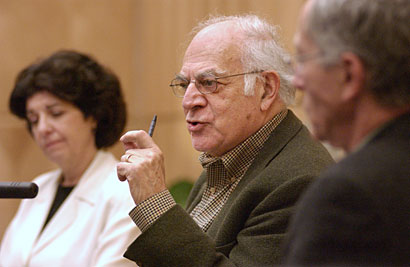Love is the 'basis of our practical reasoning,' philosopher says in Tanner Lectures
Good living comes from deciding what to care about and how to weigh it against other priorities, Princeton's Frankfurt says
BY THERESA JOHNSTON
Princeton philosopher Harry Frankfurt was once asked what prompted him to study philosophy. "I think [it] was a difficulty in deciding what else to do and the thought that philosophy didn't require me to give up anything," the white-haired professor emeritus explained. "No matter what I was interested in, it was legitimate to focus my attention on it."

Frankfurt, regarded as one of the world’s leading moral philosophers, has been recently studying the problem of practical normativity -- the area of philosophy concerned with how people should live their lives. President Hennessy praised Frankfurt’s work and said it "often engenders intense discussion" among peers. Photo: L.A. Cicero
Last week, as Frankfurt delivered the 2004 Tanner Lectures in Human Values at Stanford, it was clear that audience members appreciated the philosopher's choice of vocation. "One of the joys of reading Professor Frankfurt's work is that, intellectually speaking, he has given up nothing, while giving us a great deal," President John Hennessy noted in his introduction to the first of Frankfurt's two lectures in Wallenberg Hall. Frankfurt's essays "often engender intense discussion among fellow philosophers," Hennessy observed. "But one does not need a degree in the field -- only an interest in philosophical questions -- to find them both interesting and accessible."
Regarded as one of the world's leading moral philosophers, Frankfurt began his career studying Descartes and has written on subjects as diverse as the conditions for moral responsibility, God's omnipotence, personal identity, freedom of the will and autonomy. More recently, he has focused on the problem of practical normativity -- the area of philosophy concerned with how people should live their lives.
In his April 14 lecture, "Taking Ourselves Seriously," the scholar noted that humans are proud of their ability to reason and love; they look into their heads and hearts for guidance in how they should act. "Sometimes, to be sure, we energetically resist what reason or love dictate," he said in a booming voice. Even so, "we understand that what they tell us really does count."
But which should take precedence over our actions: the head or the heart? As Frankfurt sees it, the authority of reason is less fundamental than that of love. "Reason necessitates assent and leaves no room for individual choice," he explained. "It is entirely impersonal. It does not reveal character." Love, in contrast, "is not a conclusion. It is not an outcome of reasoning or a consequence of reasons. It creates reasons."
Although many people are convinced that moral values must be determined by reason -- independent of personal desires and attitudes -- Frankfurt thinks they are wrong. As he explained April 15 in his second Tanner lecture, "Getting It Right": "What a person really needs to know, in order to know how to live, is what to care about and how to measure the relative importance to him of the various things about which he cares." It is this understanding, he said, "that is the ultimate touchstone and basis of our practical reasoning."
For example, most people believe that self-preservation is important -- not because of reason but simply because they love living. (Even suicidal people don't really hate life, Frankfurt said; they just hate misery.) Likewise, humans generally cannot help caring about avoiding crippling injury and illness, about maintaining at least some minimal contact with other human beings, and about being free from chronic suffering and endlessly stupefying boredom -- they love being intact and healthy, being satisfied and being in touch. It's not a matter of cultural habit or individual taste, Frankfurt explained. "These fundamental necessities of the will ... are solidly entrenched in our human nature from the start."
Love, then, is a powerful and legitimate source of reasons for our actions. Of course, there are plenty of ways that our loving can go absolutely wrong, Frankfurt cautioned. Sometimes our love of one thing may conflict with our love for another. Pursuing worldly success, for example, may interfere with attaining peace of mind. Or we may not fully understand the people and ideals and other things that we love. As we get to know them better, the consequences of loving them differ from what we had supposed.
"It is not so easy for people to know what they really care about or what they truly love," Frankfurt acknowledged. Nevertheless, "there can be no authority superior to the welcome necessities of our own nature." In Frankfurt's opinion, wholehearted love definitely settles, for each of us, issues concerning what we are to care about. "It expresses what we, as active individuals, cannot help being. We have no recourse other than to accept its dictates."
In addition to his lectures, Frankfurt participated in two public follow-up discussions in Wallenberg Hall with Professors Eleonore Stump of Saint Louis University, Meir Dan-Cohen of the University of California-Berkeley, Christine Korsgaard of Harvard and Michael Bratman, the Durfee Professor in the School of Humanities and Sciences at Stanford.
The Tanner Lectures were established in 1978 by Obert Clark Tanner, an industrialist and legal scholar who studied philosophy at Harvard and Stanford and later served as a member of the Stanford faculty in religious studies. The lectures were hosted by Stanford's Program in Ethics in Society and the Office of the President.


